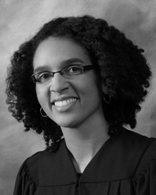Potential Supreme Court nominee Kruger is described as a moderately liberal justice on California’s top court

California Supreme Court Justice Leondra Kruger. Photo from the Judicial Council of California.
California Supreme Court Justice Leondra Kruger, a potential nominee to the U.S. Supreme Court, has taken an incremental approach to deciding cases.
Several publications describe Kruger, 45, as moderately liberal, while others note her ability to stay cool under pressure, an attribute that she displayed when arguing cases before the Supreme Court for the U.S. solicitor general’s office.
Supporters promoting Kruger to replace retiring Justice Stephen G. Breyer “highlight her poise under pressure, her legal acumen and her experience on the top court of the country’s most populous state,” CNN reports.
Kruger argued 12 cases before the Supreme Court for the Obama administration in the solicitor general’s office, where she was an assistant to the U.S. solicitor general and then acting principal deputy solicitor general. She also worked in the Department of Justice’s Office of Legal Counsel as a deputy assistant attorney general.
When arguing before the Supreme Court, “Kruger’s tone with the justices was conversational from the start, with a quiet confidence,” according to SCOTUSblog. “She was poised even when she was being peppered with questions from all sides of the bench.”
Kruger has served on the California Supreme Court since January 2015. On the bench, Kruger has been described as cautious and deliberate, the New York Times reports. According to Reuters, she has a reputation for being thoughtful and careful and for taking an incremental approach to judging.
“I see her as cautious in her use of judicial power,” said David Ettinger, a Los Angeles lawyer, in an interview with Reuters. “I think she’s concerned about digging into the details of legal issues, rather than letting ideological predilections determine the outcome of the case.”
Observers told Reuters that Kruger appears to be in the ideological middle of the liberal-leaning California Supreme Court. She is moderately liberal in civil cases and more conservative on criminal issues.
Kruger is a graduate of Yale Law School and a former clerk to the late Supreme Court Justice Paul Stevens. She worked as a summer associate at Munger, Tolles & Olson, as an associate at Jenner & Block and as an associate at Wilmer Cutler Pickering Hale and Dorr.
At Jenner & Block, Kruger met an associate who became her future husband. At WilmerHale, Kruger’s clients included the oil company Shell and Verizon Communications, according to SCOTUSblog.
Her California Supreme Court opinions include:
• People v. Buza, a 2018 decision in which the court upheld a law requiring people arrested for serious felonies to provide DNA samples. Kruger said the law was valid as applied to people arrested with probable cause for a serious offense. (Reuters, CNN, SCOTUSblog)
• People v. Young, a 2019 decision in which the court upheld a murder conviction but overturned the death sentence because jurors were asked to consider the defendant’s white supremacist beliefs. (Reuters, SCOTUSblog)
• I.C. v. Alameda County Social Services Agency, a 2018 decision in which the court held that videotaped statements by a 3-year-old child about sexual molestation should not have been used to remove her father from the home. Kruger said the statements were confusing, inconsistent and similar to statements that she made about molestation by an older child. (SCOTUSblog)
• People v. Peterson, a 2020 decision in which the court overturned the death sentence of Scott Peterson for the 2002 murders of his pregnant wife, Laci, and their unborn son. Kruger said there had been errors in jury selection. Kruger said jurors opposed to the death penalty should not have been dismissed without determining whether they could put aside their feelings and follow the law. (SCOTUSblog, Reuters)
• People v. Superior Court of San Diego County, a 2021 decision in which the court allowed a death row inmate to obtain prosecution notes regarding peremptory challenges. The inmate was seeking the notes to pursue his claim of discrimination jury selection. (CNN)
See also:
ABAJournal.com: “Can the nation endure? Breyer waxes philosophical in retirement press conference; Biden sets timetable”
ABAJournal.com: “Breyer was ‘quintessential Enlightenment man in an increasingly unenlightened era,’ op-ed says”



